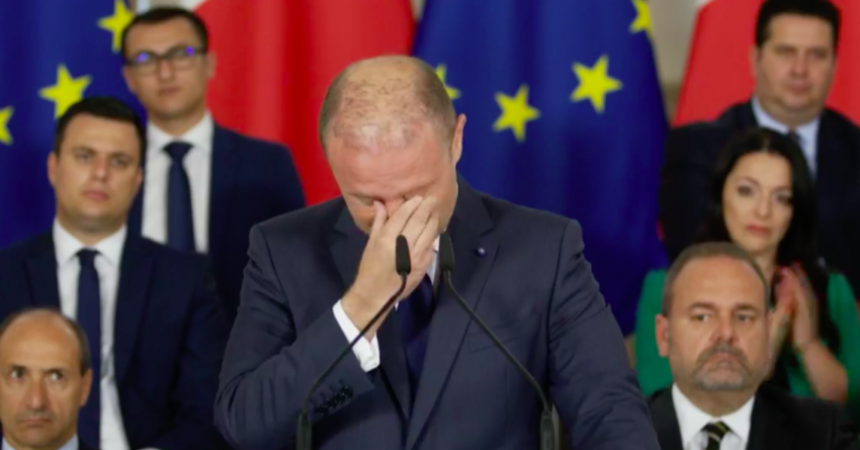The events of the past three weeks have been quite surreal; if not downright scary.
On 21 July, word seems to have got out that the Egrant inquiry was ready and being passed on to the Attorney General’s office as is the norm.
From there, since this is an ‘in genere’ inquiry, the Attorney General (AG) would normally review the ‘proces verbal’ and its conclusions and direct the police as to avenues of investigation. The AG can even send the ‘proces verbal’ back to the magistrate for further collection of evidence.
Read more: 6 things to keep in mind about the Egrant inquiry
So the AG is meant to digest the 1,500 pages of evidence and testimonies collected by Magistrate Aaron Bugeja to decide what to do next. The 21 July was a Saturday, a day when the AG’s office is usually closed.
Still, at 9:33 am that Saturday, the AG’s office issued a press release through the Department of Information (DOI) stating the Egrant inquiry’s ‘proces verbal’ (a report on the gathering of evidence, and the evidence itself) was ready and that it had been passed on to the AG’s office.
The press release noted that an “in depth analysis is underway into the inquiry and that the comprehensive report is voluminous”.
Simultaneously, also at 9:33 am that day, the Office of the Prime Minister also issued a press release through DOI noting the AG’s press release and urging the AG’s office to publish its findings as soon as possible.
That day, government controlled media and social media accounts started their engines. Labour MP Glenn Bedingfield, who also works at the OPM, upped the ante with a post ominously called “Egrant – the end nears” to set the scene. Bedingfield even added to the AG’s statement noting that it is “quite a long read” and saying that “it’s important now that the AG, who is in receipt of his findings, has the time to digest it all”.
Despite the AG’s promise of an “in depth analysis” of the “voluminous” report, at 8.30am the next morning – a Sunday – the AG’s office issued another press release through DOI noting that it was making the Egrant inquiry conclusions public and that a full copy of the ‘proces verbal’ had been passed on to the Prime Minister – the subject of the inquiry.
A PDF with a copy of part of the inquiry conclusions (pages 1,404 – 1,451) was published.
The AG’s decision to release the ‘proces verbal’ to the person investigated before a thorough analysis and further investigation is concluded, has raised eyebrows.
The PDF properties of the scan of the conclusions made available to be downloaded indicate that this was scanned the day before, Saturday 21 July, at 5:02 pm.
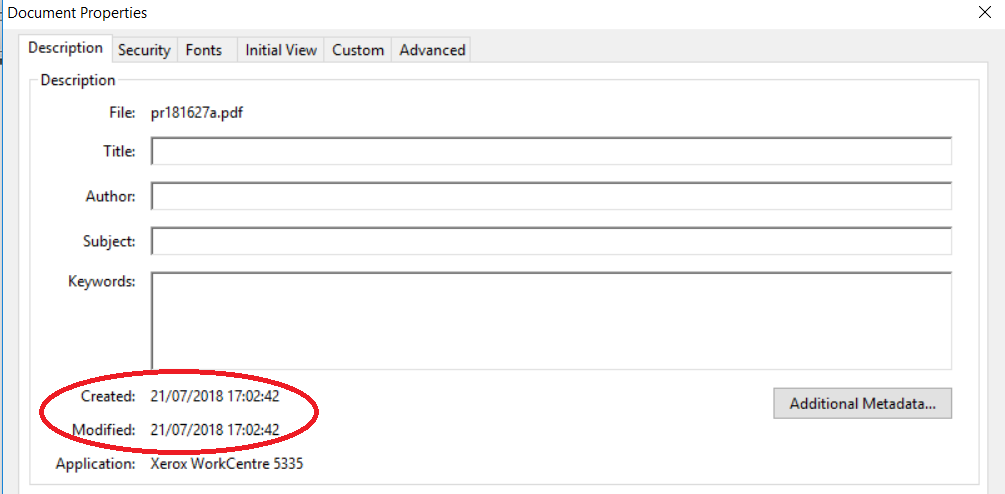
Perhaps, these are just signs of overeagerness.
As expected, the conclusions of the inquiry requested under terms dictated by Joseph Muscat’s lawyers to the Police Commissioner, who in turn opened a magisterial inquiry instead of investigating the report, were favourable to Muscat (if somewhat inconclusive for those actually hoping for clarity about Egrant’s real ownership and purpose).
What followed that Sunday morning and the following weeks was a veritable onslaught.
In between the tears, Muscat just stopped short of vowing to hunt down all those (dead or alive) who claimed he was somehow involved in his chief of staff Keith Schembri, tourism minister Konrad Mizzi and Nexia BT’s Panama adventures. He did, however, start dropping hints about where things would go next, with chilling indications that in parts of the ‘proces verbal’ that only he (and his team) saw, the magistrate recommended investigation and prosecution for perjury and slander.
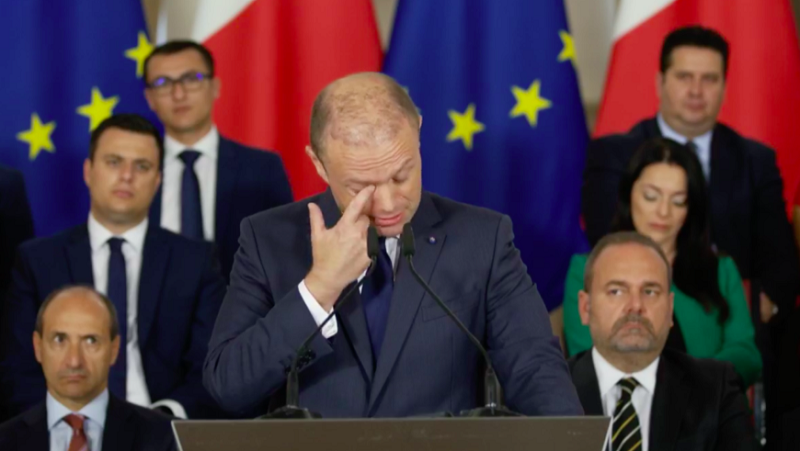
Instantly, government-controlled media and social media accounts exploded into a flurry of press releases, posts and videos all selling one narrative: The Egrant inquiry was massive, expensive, cleared everyone and that the Prime Minister, and by extension those around him, were unjustly accused by evil doers.
The overload was so extreme that The Shift was able to populate its already planned weekly Disinformation Watch article on the techniques used by the government to manipulate public opinion with examples of their use on the subject of Egrant just following this press conference and its immediate aftermath.
Even Pilatus Bank’s owner, currently in the US with a tracker anklet awaiting trial by jury for alleged US sanctions busting, joined in the fray claiming the Egrant inquiry cleared him too.
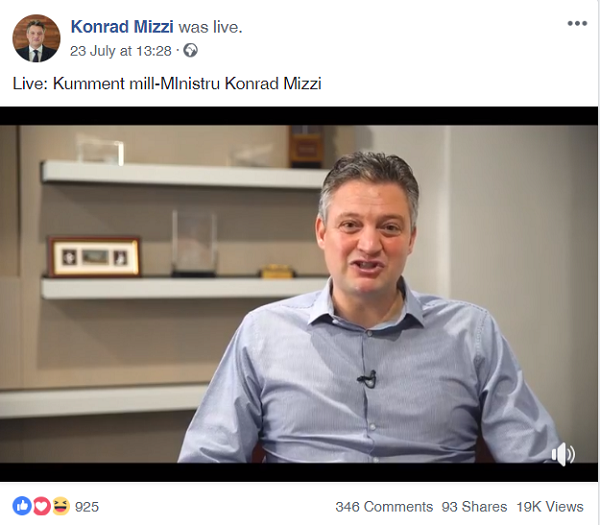
Tourism Minister Konrad Mizzi posted a video on Facebook saying the inquiry absolved not only the Prime Minister, but also Mizzi himself, which is not true.
Not happy with just pushing a false narrative that everyone was cleared, the air became quite sour.
Soon, the narrative turned towards warning the media against further “lies”, taunting journalists, chasing MEPs for apologies, hounding the former Opposition Leader, wishing assassinated journalist Daphne Caruana Galizia alive purely to “hold her to account” and calling for a public lynching of the whistleblower.
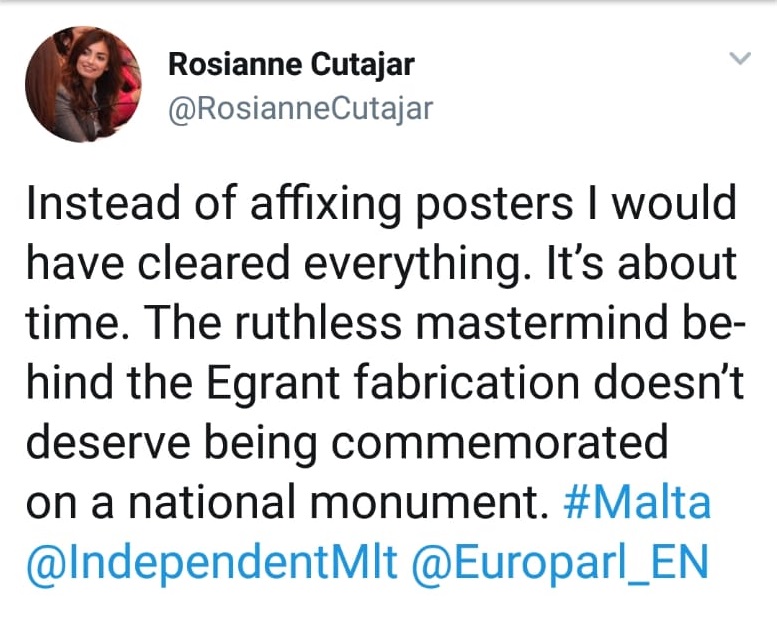
One of many posts on social media by Labour MP Rosianne Cutajar reflecting the narrative used by other members of the Office of the Prime Minister.
But nobody uttered a word about bullying.
Then the next phase started.
On the one hand, Justice Minister Owen Bonnici warned that criticising the magistrate’s conclusions (or even just pointing out its limitations) would be an attack on the institutions and the “rule of law” (a buzz word the government seems to have discovered since it came into question).
Separately, the pro-Muscat brigade including retired judge Philip Sciberras no less, started warning the public to expect another “lie” (ie. do not listen to the independent media), at the same time as false information was being spread by government members.
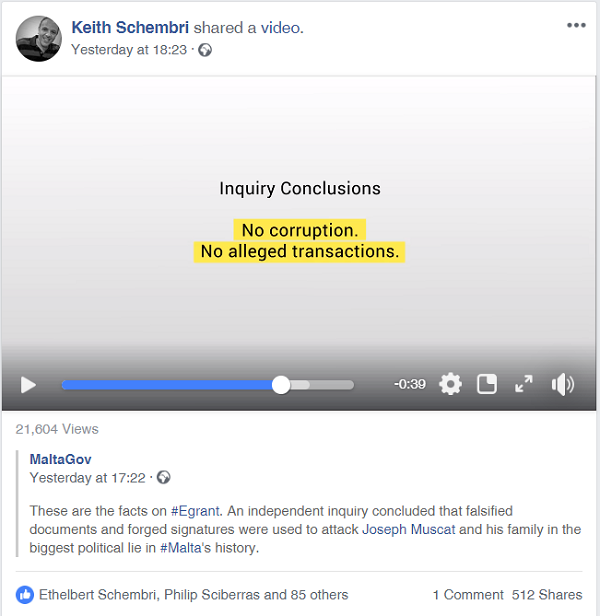
While promising that someday the public will get a look at the remaining 1,450 pages, Muscat continues to drop further hints on Labour Party media stations only about prosecutions. The latest being that there may be more falsified documents that the police are investigating.
Yet, there was no word on bullying until the Prime Minister’s wife, Michelle Muscat, pointed a finger at the school her children attend to say they did nothing to protect them from bullying. All those who rode the bandwagon to criticise an article penned by the former Opposition Leader’s partner Kristina Chetcuti – in which she did not condone bullying – never thought to look at the broader picture of the co-ordinated attack against her.
Control of the narrative on the Egrant findings remains in the hands of the Office of the Prime Minister. Press conferences from the Police Commissioner are no longer possible in Malta. Now the Prime Minister announces the results of inquiries into himself and provides updates into police investigations about people who might have triggered the need for an inquiry into himself.
It is necessary to maintain the call for the publication of the full report because only then can a full picture be obtained, as opposed to what is convenient or what is being intentionally drip-fed while an assault on social media continues unhindered.
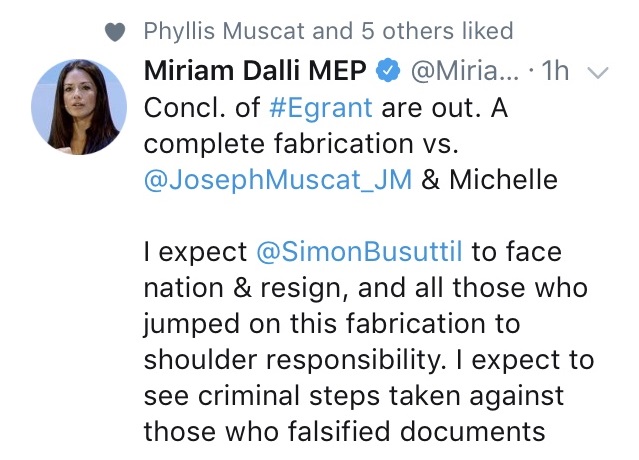
A post by Labour MEP Miriam Dalli – it is not clear whether she has seen the full report which should not have been divulged to third parties by the Prime Minister.
Egrant is part of a wider picture. And this inquiry’s scope was narrow – it did not even seek to establish Egrant’s intended owner, its purpose or whether it did anything outside Pilatus Bank.
What we know so far does not offer any closure given the company had bearer shares (ie ownership was transferable with the simple passing on of a slip of paper), it was wholly controlled by Nexia through a power of attorney, and Dubai did not co-operate with requests for information.
Also, if there is any chance that someone did in fact mislead or lie, the public needs to understand who did it, and why. The government’s narrative will not do, not when the Prime Minister is sitting on 1,500 pages of evidence.
Even Pilatus Bank’s owner, currently in the US with a tracker anklet awaiting trial by jury for alleged US sanctions busting, joined in the fray claiming the Egrant inquiry cleared him too.
The government’s narrative about “lies for power” just do not wash, especially given that the 2017 election was already planned before the whistleblower spoke to Caruana Galizia and she broke the story about Egrant.
The other inquiries also need to be concluded and published. It is not clear why the inquiries in relation to the Prime Minister’s chief of staff, which were far more straightforward than the Egrant inquiry, are still pending.
Meanwhile, the Prime Minister and those involved continue to object to and appeal the opening of a full inquiry into Panama Papers, including 17 Black. Why?
For two years since the release of the Panama Papers, we have seen investigations into the behaviour of members of government stalled and delayed. Now evidence in an inquiry on the Prime Minister is in his hands and being used to intimidate and hunt down dissenters.
But let’s just keep talking about children not being invited to parties, while sidelining the fact that these are not the actions of a government that has nothing to hide. The Egrant story is a part of a wider picture that needs to be understood. And it’s clearly far from over.

